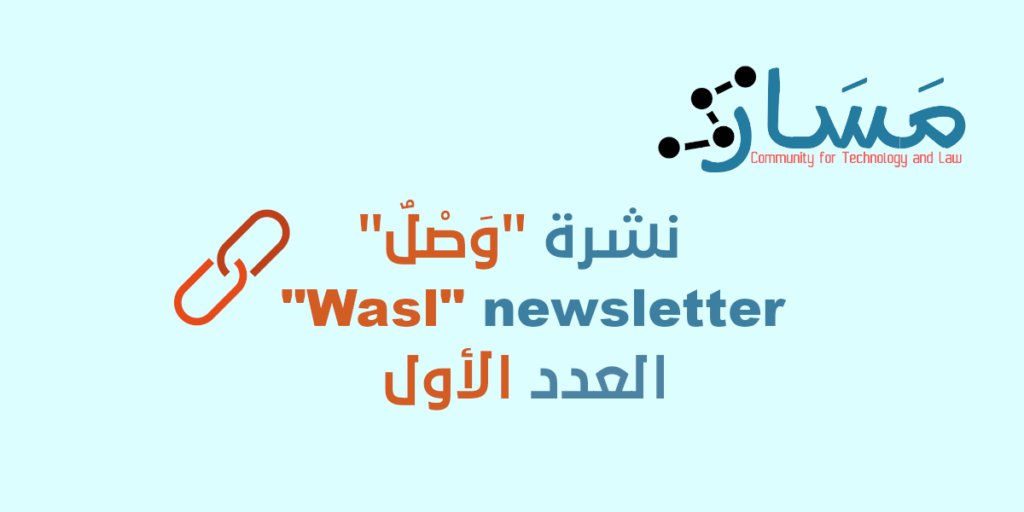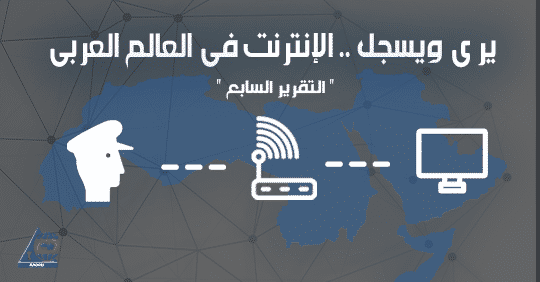“Wasl” Newsletter: the first issue
A non-periodical newsletter issued by Technology and Law Community (Masaar) on news and activities related to digital rights in Egypt.

Masaar’s Activities
- Masaar issued a brief report on the state of internet censorship in the times of social distancing and the curfew imposed to limit the spread of the novel coronavirus. The report documented the blocking of the “Daaarb” news website, the third website for journalist “Khaled Al-Balshi to get blocked by the Egyptian authorities. The number of alternative domains that the authorities have blocked for “Mada” news website since May 2017 has reached 22. Also, the authorities have blocked alternative domains for “Al Manassa” news website. The “We Telecom Company” has blocked porn websites during the hours of the curfew. This measure was likely taken to reduce the pressure on the network. Link for the report
- Masaar issued a manual on licensing news websites. This manual aims to clarify the legal and administrative procedures needed for registering websites that provide digital press services to the Supreme Council for Media Regulation. The manual is directed to those in charge of ownership or management of websites, and lawyers who are responsible for registering these websites before the competent administrative authorities.

The manual comes after the approval of the by-law of the Media and Press Regulation Law, which was delayed for more than a year, as the law was issued in August 2018. In addition to clarifying the procedures of the licensing process, the manual seeks to explain some ambiguous provisions in the articles of the by-law, as well as defining the legal position of websites that were created earlier under different regulations. This manual also sheds light on the websites that took some measures after the Supreme Council for Media Regulation directed them to legalize their situation immediately after the issuance of the Media Regulation Law. Link for the manual
- Masaar held a webinar on Tuesday, May 5, on “Tools and Applications of Digital Security in Remote Work”. This discussion is the first of a series of conversations entitled (8-bit) which Massar aims to organize during the coming period. Ahmed Mekkawy, director and founder of Spirula Systems and Mohamed Tita, director of systems and servers, participated in the discussion. The discussion addressed solutions and tools available for businesses and individuals to facilitate remote work. The conversation with Mekkawy and Tita also covered tools and solutions for project management and task follow-up, communication and chatting between the working group and, tools and solutions for organizing meetings and discussions on the web, and tools for sharing files and backups.
https://youtube.com/watch?v=yCSpFFAndR8%3Fcontrols%3D1%26rel%3D0%26playsinline%3D0%26modestbranding%3D0%26autoplay%3D0%26enablejsapi%3D1%26origin%3Dhttps%253A%252F%252Fmasaar.net%26widgetid%3D1
Link for a list of secure software recommended for remote work
- Psychological Support for Medical Staff initiative cooperated with Masaar in developing a privacy policy to enhance transparency between the initiative team and the beneficiaries of psychological support services. The voluntary Psychological Support for Medical Staff aims to provide psychological support to medical personnel through the Internet. The first version of the (Privacy Policy) was launched on the initiative’s website. Link for the privacy policy
- Masaar joined more than 100 international and regional organizations in issuing a statement calling on governments to stop using digital surveillance techniques in violation of the right to privacy while facing the Covid-19 pandemic. Link for the statement
- Masaar participated with a number of human rights organizations in issuing a statement calling on the Egyptian authorities to stop restricting rights and freedoms on the Internet. The signatory organizations called on the Egyptian authorities to review the laws that restrict rights and freedoms and to repeal ambiguis phrases and terms that threaten individual and public freedoms. They also called on the authorities to put an end to policies and practices that restrict fundamental rights and freedoms, especially those related to internet freedom and the freedom of information. Finally, these rights groups demanded that authorities unblock websites and release prisoners detained for cases pertaining to the freedom of expression, internet freedom, and social media. Link for the statement
Publications of civil society organizations
- The Arabic Network for Human Rights Information (ANHRI) released its seventh report on the Internet and the Arab world. ANHRI issues this report every two years since 2004. The report monitored the state of the Internet in 12 Arab countries, including Egypt, and it addresses five topics for each country “developments in the telecommunications sector, the legal environment for the telecommunications sector and the Internet, social networks, blocking and censorship, prosecution and security threats.” With regard to Egypt, the report addressed Internet laws that were issued during the period covered by the report, namely the Law on Combating Information Technology Crimes, the Media and Press Regulation Law and a draft law submitted by the Communications Committee in the Parliament on the protection of personal data.

News
- The National Telecommunications Regulatory Authority (NTRA) released the report (Results of Measuring Quality of Mobile Network Service) for March 2020. As NTRA has conducted tests of measurements of the quality of mobile services in 80 different regions, the tests included indicators related to measuring the rate of non-start calls (Callblovk), the rate of incomplete or interruption of calls (Call drop), the sound quality of calls (Voice quality), the speed of downloading data (Download / Upload throughput). The report included the four mobile service providers; Vodafone, Orange, WE and Etisalat Egypt. NTRA has notified the companies of the malfunctions in the abovementioned services and their locations before publishing the report. NTRA has also warned the companies of taking escalatory measures in case these services do not improve for reasons not beyond their control. Link for the report
- The Social Communication and Guidance Department of the Egyptian Public Prosecutor issued a number of press releases on investigations carried out in cases related publishing content on the Internet in violation of “public decency standards“. Among them is the case of the student “Haneen Hossam”, who is famous for her videos on social networking applications. Prosecutors issued an arrest warrant for “Hossam”, charged her with violating family principles and values in Egyptian society, creating, managing and using websites and personal accounts through social networking applications on the International Information Network with the aim of committing illegal acts. These charges indicate the first application of the Anti-Cybercrime Law.
- The Public Prosecution issued a decree last November to form the Social Communication and Guidance Department, which includes three units (the Media Communication Unit, the Electronic Media Unit, the Monitoring and Analysis Unit). The decree stataed that the reason for forming the Department is to verify and develop the pages and accounts of the Public Prosecution Office on social media, achieving effective communication between the public prosecutor and citizens through social media and various media, clarifying the facts to the public opinion and refute false news, statements, and rumors about the functions of the Public Prosecution.
Link for the Public Prosecution’s statement on Facebook
- In the same vein, the security forces arrested a well-known “Tik Tok” user”Mawada Al-Adham”, and the artist “Sama Al-Masry”, on charges of assaulting family principles and values in Egyptian society and creating, managing, and using websites and accounts on the information network with the aim of committing illegal acts. These are the same accusations faced by the student “Haneen Hossam”, and all the accused are still being held in pretrial detention pending investigations.
- On the other hand, Lina Atallah, the editor-in-chief of “Mada Masr” news website, was released on bail of 2000 LE, after the public prosecutor accused the journalist of photographing military installations -Tora Prison- without permission. Security forces detained “Atallah”, while interviewing with “Laila Soueif”, the mother of the imprisoned activist “Alaa Abd El-Fattah” about his prison conditions and the hunger strike he had started due to ban on visits.
The first court ruling against a defendant for hacking Facebook accounts
In an implementation of the Anti-Cybercrime law No. 175 of 2018, Tanta Economic Court issued a two-year prison sentence with labour and a fine of 100,000 Egyptian Pounds, against a defendant who hacked an account on Facebook. He was ordered released on a bail of five thousand Egyptian Pounds pending trial.
The court sentenced the defendant according to the provisions of Article 18 of the Anti-Cybercrime Law, which states that “A penalty of imprisonment for no less than a month, and a fine of no less than fifty thousand pounds and not exceeding one hundred thousand pounds or by either of these two penalties, shall be imposed on anyone who breaks, hacks or slows an email, a website, or an account belonging to an individual. If the crime occurred on an email, a website, or an account belong to a private entity; the penalty shall be imprisonment for no less than six months, and a fine of no less than one hundred thousand pounds and not exceeding two hundred thousand pounds, or by either of these two penalties.
The authorities issued the Anti-Cybercrime law in August of 2018, and the executive regulations of the law have not been released yet. Article 44 of the law stipulates that the Cabinet has the authority to issue the executive regulations of the law within three months from the date of implementation of the law.
Link for the sentence
